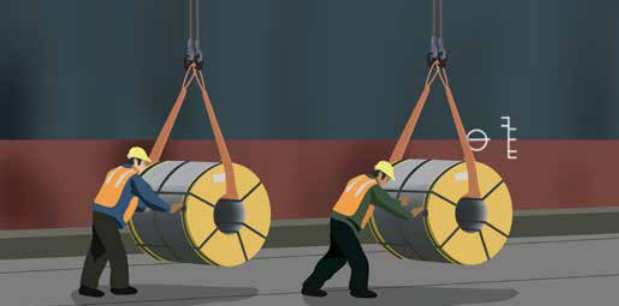Steel is a high-value cargo, which can be easily damaged by rough handling, water and moisture. Cargo damage can occur for a number of different reasons in transit or before loading. The Standard Club issued a guide focusing on correctly loading, stowing, caring for and securing steel cargoes to prevent any damage claims.
The guide contains useful Do’s and Don’ts for the loading checklist of steel cargo:
DO
- Pre-plan steel stowage. Make sure steel is stowed on solid floors and, when applicable, key coils are positioned correctly. Coil widths and/or cargo dimensions may not always permit ‘textbook’ stowage.
- Mark the location of solid floors in the cargo space to enable easy reference during loading.
- Make sure cargo spaces are squared off by construction of a stout buttress or support. Use new timber and remember that No. 1 hold is most likely to be the hold where damage might occur.
- Wash holds with fresh water before loading, remove all debris and hard objects, fully dry the holds.
- When arranging stowage of steel coils, make sure the maximum tank top point load is never exceeded.
- Arrange for key coils to be placed in such a manner that the coil’s bottom edge is one-third of its diameter below the top edge of the coil being locked. Stagger the position of key coils to avoid overloading the tank top.
- Make sure sufficient dry dunnage, of the correct type and thickness, is used.
- Use dunnage of uniform thickness, two inch thick for coils. Remember, certain countries have import regulations that apply to ship’s dunnage. Check the regulations before taking dunnage and use only approved dunnage, especially if discharging in North American ports.
- Record all pre-shipment damage on mate’s receipts or bills of lading by carefully describing the damage found and clearly identifying the damaged article.
- Load steel dry, especially if steel is packaged (wrapped).
- If required to load wet steel, endorse the bills ‘wet before shipment’.
- Ensure hatch covers are weathertight before loading.
- Segregate, and load in a different hold, steel that must be kept dry, from steel that can be loaded wet or products that contain moisture.
- Work with the surveyor to examine steel for preloading damage.
- Double-check any cargo found damaged. Make an effort to understand what the surveyor is looking for.
- Whenever surveyors visit to examine cargo, check their credentials to verify who they are acting for, before allowing access to the ship or cargo.
- Minimise the amount of cargo stowed with metal-to-metal contact. If this type of stowage is unavoidable, make sure the cargo is not wet. Wetness reduces frictional resistance and increases the danger of cargo shifting during ship rolling. Special care is needed when loading during periods of rain showers.
- Try to avoid loading damaged cargo but accept that this may not be possible, in which case, stow this separately on top and endorse details of the damage on the bills of lading. Bent and buckled steel can be shipped for reprocessing, but the bills should not record the cargo as ‘steel products’.
- Report to the P&I correspondent or ship’s owners when problems are found with cargo or cargo stowage.
- Take daily dew point readings of hold and outside air, ventilate or dehumidify when necessary. Keep detailed records of these measurements.
- Remember the voyage ventilation mantra, cold to hot, ventilate not. Hot to cold, ventilate bold.
- Calculate the ship’s GM and, if possible, take measures to reduce high values.
- Weather-route to avoid swell conditions that cause heavy rolling and wavelengths equal to half the ship’s length, which can initiate parametric rolling in slender ships during pitching in head seas.
- Remember that cargo has to be properly chocked and secured, and that only steel coils and semifinished steel slabs stowed in California block stowage are lashed to themselves. All other steel is lashed to the ship.
- Point out any ship or cargo hazards or limitations to the stevedores.
DON’T
- Rely on stevedores to determine cargo stowage. They may opt for the easiest stowage rather than the best. • Use the maximum allowable tank top loading weight to determine the number of steel coils that can be safely loaded. Steel coils produce a point load. The maximum allowable tank top loading weight assumes a homogenous weight distribution.
- Be surprised if the textbook size and type of dunnage is not delivered to the ship. The dunnage supplied may be the best available, in which case, greater application of dunnage may be required.
- Use wet or ‘green’ timber for dunnage.
- Sign, or allow the ship’s agents to sign, clean bills of lading or mate’s receipts for damaged cargo.
- Allow coils to be loaded in a pyramid pattern.
- Load steel before evaluating the strength of the tank top against the proposed weight distribution.
- Ventilate when the relative humidity of ambient (outside) air is greater than that of the hold air or when the ambient air’s dew point is greater than the temperature of the cargo. These conditions exist when cargo is cold, because it was loaded in winter (cold) conditions for discharge in, or passing through, summer (warm) conditions.
- Ventilate if unsure that ventilation conditions are correct.
- Stow steel products in the same compartment as cargo with different ventilation requirements.
- Load steel in holds that have previously carried oxidising agents or acidic compounds, until the holds have been thoroughly washed with fresh water and dried.
- Think that space remaining in the hold after loading steel needs to be filled with other cargo; it does not. When loading a full cargo of steel, the tank top maximum loading will be reached before the hold is full and often before the ship reaches her marks.
Explore more herebelow:































































does dry bulk cargo iron ore uses any dunnage after or before loading into the cargo hold vessels? thank you